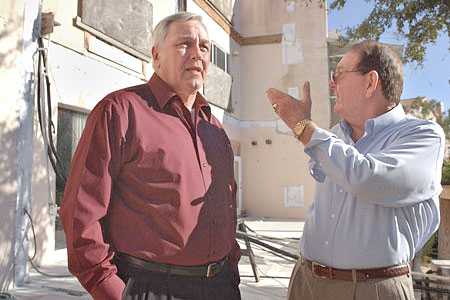| Article Courtesy of St. Petersburg
Times
By ROBERT FARLEY Published January 17, 2004 EAST LAKE - Vincent Tuccio, it would seem, has every right to be angry.
On Friday, the 2nd District Court of
Appeal overturned a previous ruling that all 182 Nature's Watch homeowners
should split millions of dollars in repair bills.
Had the appeals court not acted, Tuccio said, he surely would have lost his home. Tuccio said he never would have been able to pay $92,000. He is betting it will be a lot cheaper to just fix his own home. Although most residents in Nature's Watch rejoiced at the ruling, all agree it raises many complex questions. Most residents already have paid the $28,000 worth of assessments to fix the first six four-unit buildings. Repairs to a seventh are almost finished. Already, about $4-million has been spent on construction experts, attorneys and repairs. Nature's Watch has been a mess nearly from the start. After it was built from 1992 to 1998 by a company led by developer Richard Geiger, its townhomes sold for $125,000 to $300,000. Over the years, water damage started to appear. Balconies became unsafe to use. A group of neighbors in the oldest and most heavily damaged townhouses were told they were on their own, so they sued the homeowners' association to help pay for repairs. Retired Judge Fred Bryson was brought in to mediate the case. He determined that the bylaws put all of the homeowners on the hook equally for repairs. He further ruled that the association was responsible for exterior repairs and that exterior meant everything from the interior paint out. Then, when Bryson felt the association was not committed enough to repairing life-threatening building flaws, he appointed a receiver to take over the association and impose the assessments on them. Those who didn't pay were threatened with foreclosure. On Friday, the appellate court ruled that Bryson had improperly treated Nature's Watch like a condominium. The appeals court further ruled that Bryson's interpretation of the definition of exterior was "unreasonable and erroneous." It was the news many residents had been praying for for more than a year. "This is one of the greatest days of my life," Ed McDermott said as he sipped a celebratory beer with his neighbor on Friday afternoon. Like several dozen of his neighbors, McDermott stopped paying the assessments on principle, arguing he had no business paying for repairs to his neighbors' homes. He figures he's out the $14,000 in assessments he did pay. "I'm glad I didn't pay it (the other $14,000)," he said. "I feel sorry for the people who did." His neighbor Chuck Badgley said the appeals court was all that stood between most residents and financial ruin. "We had exhausted every conceivable means," Badgley said. "We had approached every state and local agency we could think of, and they couldn't help. We were down to Custer's Last Stand. This is a monumental decision." Now, he said, residents can make repairs to their own homes and seek payments from their homeowners' insurance. Still, he said, many complicated decisions remain. There is still much work to do to repair Nature's Watch. "It's going to take a lot of work to unscramble the egg," Badgley said. "It's going to take a lot of cooperation to get this thing back together again. ... There will be fighting and arguments, sure, but at least we know there's going to be an end game." Attorney Henry Stein represented the homeowners in the oldest, most damaged units who filed the lawsuit to force the homeowners' association to pay for all repairs. On Friday, he warned that the ruling might not be the panacea many residents are hoping for. "I think this decision is going to throw their homeowners' association into chaos," Stein said. "It really creates an enormous amount of confusion." For example, what if one resident in a four-unit building is not insured and refuses to help pay for repairs to water-damaged walls in a building? Stein said he will file a motion asking the appeals court to reconsider. "Everything now is at a dead stop," Stein said. Attorney Philip Campbell, who represented the homeowners who argued against shared responsibility for repairs, said the ruling could save Nature's Watch. "I know people use this phrase too much but, "There is a God,"' Campbell said. Although the first 12 buildings have significant water damage, Campbell thinks the balance of the buildings do not. He thinks most of the buildings can be repaired at a substantially lower cost than the court-appointed receiver's experts estimated. As for the $28,000 paid by most residents to date, Campbell said, "they're not going to get that back. "I believe at this juncture they need peace. I think they need to bite the bullet and move forward. The idea is not to spend any more money on lawyers." Resident Jim Foggett said the repair process had become a "runaway train." He hopes the ruling will mean residents can elect a homeowners' association board to bring control of the situation back to the residents. Beyond that, he's not sure what will happen. "There are as many unanswered questions at this point as ever," Foggett said. "But they're different questions."
|
